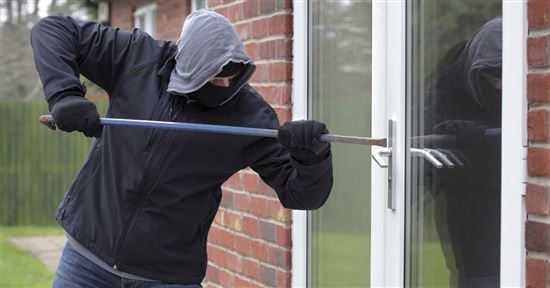23 Home Invasion Statistics You Should Be Afraid Of
Home invasions aren't always violent. 11% of burglars even remove a door or window while the occupants are home. The average loss is around $2,799 per home invasion.
 |
The more aware you are, the better you can protect yourself. Read on to see how you could easily become a victim too.
- How many home invasions are there in the U.S.?
According to the U.S. Department of Justice, 1.03 million home invasions occur each year. - What time of day do most burglaries occur?
Surprisingly, most burglaries occur between 10 AM and 3PM. Many homes are empty during this time while people are at work. Burglars know this and use it to their advantage. However, home invasions can occur any time of day or night.Related: Why Burglars Single You Out - How many homes are broken into each year?
3.7 million homes are broken into each year. That's 7 homes every minute.Related: Best Home Security System
Home Invasion
- What is home invasion?
Home invasion is the unlawful entry of someone's home. It usually involves some type of force. The person has the intent to commit a crime (whether he does or not). The legal occupant of the home may or may not be present. - How long is the sentence for home invasion?
Most states consider home invasion a felony. The general jail sentence can vary from 5 to 20 years. It depends on the degree of the home invasion. 1st degree is the worst. It usually involves the use of a weapon along with breaking and entering. - How long do you go to jail for burglary?
Burglars face similar jail time as those committing home invasion. The degree of the burglary and whether it's a misdemeanor or felony determines the jail time. Offenders can go to jail for 1 year to as much as 20 years. In addition, they pay hefty restitution fines.
Burglary
- What is robbery versus burglary?
Burglary and robbery both involve a property. They both also describe some type of theft. Robbery occurs in a home while you are present. The criminal usually uses some type of force or threat. Burglary occurs when you are not home. The criminal unlawfully enters your home with the intent to steal something. - How many homes are robbed each year?
The DOJ reported 1 million burglaries occurred with people in the home. 27% of them became victim of a violent crime. - What are the chances of being robbed?
According to the FBI, you can expect 1 in every 36 homes to be robbed. - What percentage of robberies involve weapons?
The DOJ reported the use of weapons in a majority of robberies. 38.2% of robberies involved firearms and 8.3% included knives or other cutting devices. In addition, 43% used strong-arm tactics, whether verbal or physical. - What percentage of burglaries involved forcible entry?
Forcible entry occurs when someone enters a home with some type of force or weapon. Almost 56.7% of home invasions used some type of forcible entry. Almost 6.6% of the burglaries accounted for attempted forcible entry. The remaining were unlawful entries with no force. - What time of day does the most crime occur?
The most common time for crime by an adult to occur is at 10 PM. The most active time for adult criminals is between 8 PM and 12 PM. Juvenile criminals, on the other hand, are the most active between 3 and 4 PM. - What percentage of invaded homes don't have anything taken?
Criminals don't get anything 55% of the time when the home is occupied. Non-occupied homes have a 75% chance of theft. - What rooms do offenders usually hit first?
A majority of offenders head straight to the master bedroom. Many homeowners leave their most valuable items in this room. The typical items include cash, jewelry, and weapons. In the master bedroom, they often head to the nightstand and closet first. - Do burglars return to the scene?
Unbelievably, you are more likely to be a burglary victim after being a victim once. Even if you aren't the victim, but a neighbor is victimized, your chances are higher. A burglar returns to the scene because he's already done the work. He knows the area so it takes less effort to get the job done.
Guns
- How many home invasions were stopped by guns?
The government doesn't put a lot of emphasis on defensive gun use. Estimates show that 500,000 to 3 million defensive gun uses occur each year. - How many times do victims use a gun to scare their offender?
A shocking 2.5 million victims use a gun to scare their offender. That's almost 5 law-abiding citizens a minute. However, victims only shoot their offender 8% of the time. They mostly use the firearm to scare their offender away. - How many gun deaths are accidental?
In a 5-year span ranging from 2005 to 2010, 3,800 people died at the hand of a gun accidentally. Of those victims, almost 1,300 of them were younger than 25 years old. Generally, the states with looser gun laws had the higher number of deaths. - How many people have died from guns?
According to the CDC, 93 people die every day from guns. That's almost 40,000 deaths a year. Of those deaths, suicide was the reason twice as often as homicide. - What percent of homicide victims knew their killer?
27.8% of homicide victims knew their killer. The relationships vary from significant other to friend or acquaintance. - What percentage of murderers were male?
The Department of Justice claims that 90% of murderers are male. - How many women are criminals?
Estimates report there are around 2.1 million violent female criminals per year in the United States. 40% of them were under the influence of drugs or alcohol.
Home Security
- What's the best way to keep your home safe?
There's no foolproof way to prevent a home invasion. These tips may help keep criminals away, though.- Always make your home look occupied. Leave lights on and the exterior manicured. Don't leave mail stacked up in the mailbox. Have your grass cut even while you are away.
- Lock all doors and windows, including when you go to bed.
- Test all locks on windows and doors periodically and replace as necessary.
- Keep everything stored out of sight.
- Always make your home look occupied. Leave lights on and the exterior manicured. Don't leave mail stacked up in the mailbox. Have your grass cut even while you are away.
Knowing the statistics should keep you on your toes. Constantly monitor your home's safety. Becoming too comfortable can make you a victim. If you're concerned with protecting your home against burglars, it may be worthwhile to invest in a home security system.
Sources and References:
Write to Kim P at feedback@creditdonkey.com. Follow us on Twitter and Facebook for our latest posts.
Note: This website is made possible through financial relationships with some of the products and services mentioned on this site. We may receive compensation if you shop through links in our content. You do not have to use our links, but you help support CreditDonkey if you do.
Read Next:
